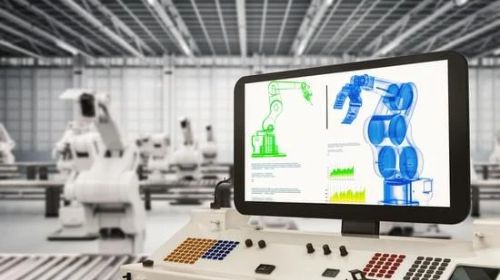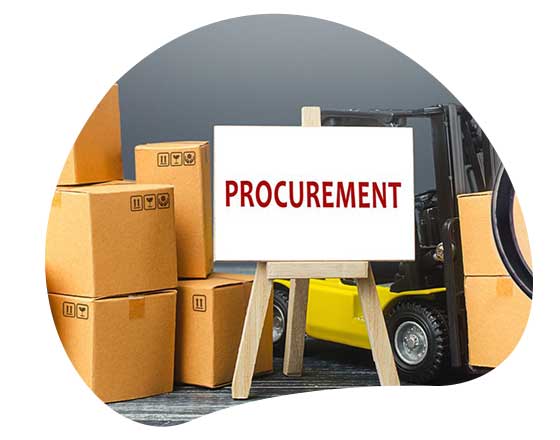ERP Software for Industrial Automation
Drive your industrial automation process to the next level with Sage ERP
Drive your industrial automation process to the next level with Sage ERP

Automation is an irreplaceable term in the manufacturing sector. India has recently secured 3rd position in automation implanting for various business processes. This industry has come a long way and is constantly developing with different trending and upcoming technologies like AI, machine learning, etc.
Across various industries from manufacturing to retail and distribution, ERP Software for industrial automation is a widely used concept to accelerate business growth. Instead of using multiple software to manage different departmental activities, switch to a single integrated solution.
In a coming couple of years, industrial automation is anticipated to grow at a CAGR of 10-12 percent. Sage X3 ERP system encompasses robust features to achieve this and help companies thrive in the never-ending competition.
It is a big challenge for the procurement team to procure the right material at right time and at the right cost to maintain the costs of manufacturing. Likewise, all processes in the shop need to be systematic and simultaneous for better product output. There are multiple levels of assemblies and sub-assemblies involved in the machine manufacturing process. The next critical challenge is the planning and production activity of the assemblies and Machines.


Strategic and thoughtful planning is very crucial when it comes to deploying new technology in the current condition. As per the requirements, transformation is needed with respect to the machinery as well as automation. Also, detailed analysis is quite essential to continue automation in the present business which is the main challenge.
Some of the companies in the industrial sector are quite old. Hence, adapting to the new technology and methodologies proves to be challenging and include massive expense. Such change is essential for profits in the business. Though, this acts as a major challenge.


Training the workforce is one of the challenges for businesses when it comes to automation. The main purpose of automation is to reduce human intervention while minimizing errors. Since the introduction of automation in businesses, automatic tools have themselves become a strong workforce. Hence, it is quintessential for businesses to train their employees whenever needed and stay abreast of the industry requirements.
The Purchase order module in the Sage 300 ERP system for Machine Shops provides the purchaser, the right to procure the right material at the right cost for various departments. Purchase action report, Vendor costing analysis, Purchase history, Expected material arrival report, and other functions of procurement software helps your purchaser to increase purchasing efficacy.
Sage 300, a best Inventory management Software for machine shops helps the warehouse manager to control & maintain their minimum level inventory and not overstock the current assets. At any point in time, one can do a valuation of their stock on real-time data and reconcile with the bank with accurate figures.
You can analyze your production cost at any point in time with our Accounts Payable Software. The accounts payable and Accounts receivables module helps you and your finance team to maintain their book of accounts in a more effective manner. Sage enterprise resource planning is the solution that helps the machine manufacturing industry to view its business in 360 directions.
The finance module of the automation ERP system is structured to reconcile accounts-related tasks, vendor payments, close books instantly, etc. It also helps you automate the billing processes of manufacturing companies.
Empower your team and elevate your results with ERP Software
With help of the Sage X3 ERP system, manual tasks can be converted to automated ones with more accuracy. Therefore, the need for paper bills or paperwork can be minimized which will eradicate the need for stationary along with the workforce. This helps in saving a huge amount of paper and assisting in minimizing carbon footprint.
Sage 300 ERP can help automate the complete data analysis process while also helping in forecasting the results with respect to various market conditions. This helps in making improved decision-making. The business management software also helps predict how many units are allocated to which resource and what can help us in getting the best assets. With the help of industrial automation ERP, more than 80% of companies experienced better ROI while making better customer relationship management.
Industrial automation enterprise resource planning helps companies promote remote work since it allows employees to access their data remotely from anywhere and at any time. Also, employees can edit, delete, and update their data placed over the cloud easily. This adds more flexibility to the workforce while increasing their overall productivity. It aids in maximizing the profits of the company.
Sage X3 ERP uses real-time data with which multiple business units can make informed business decisions which can thereby profit them. Industrial machinery ERP offers real-time accurate data analysis that also helps forecast the analytics and see if there is any flaw in the supply chain management functioning.
Machine manufacturing involves the procurement of various types and raw materials, spares, and consumables items, processing and tracking them at every stage, and finally the allocation and distribution of the finished product.
Schedule Product Tour
"*" indicates required fields
Fill in the details below and we would be glad to help you.